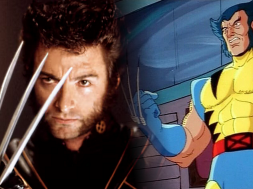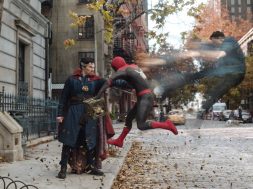
A cursory look at the trailer for Clio Barnrd’s latest film The Selfish Giant would not suggest a movie going experience that bespeaks geek culture, that subject that is the cornerstone of this very website. Yet to make such a judgement would, I posit, be premature at the very. The film follows the lives of two boys who are best of friends. Although the lads are almost inseparable they make a funny pair, in fact the opening sequence it put me in mind of Groucho Marx complementing two different women simultaneously: “You’re tall and short; and slim and stout; and blonde and brunette and that’s exactly what I like in a girl”. In Barnard’s film the differences in characterisation are obviously more than just superficial, yet the physical dissimilarity was clearly a factor in casting. Following and incident at school, these friends are excluded (one temporarily and another permanently) and start working for a local scrapping company.
Ordinarily I would be comfortable divulging a few more spoilers and more of the plot. However, the film in so plot light that it be unfair to go on. Fortunately, plot – at least in this film – is not a measure of quality. The film runs the length and breadth of the emotional scales that caused me to gawp and grin in equal measure. Perhaps its crowning achievement is that the film is so well-balanced that even at its most provocative it manages not to be emotionally pornographic.
 It is this emotional richness that is what made me first consider this film as appropriate for reviewing on the Arcade. The experiences the film depicts are not incongruous with the archetypal nerd narrative furnished as it is with feelings of isolation and loneliness. More than that, Swifty – the temporarily expelled student – has a love of horses the extent of which is not even shared with his closest friend: an unshared special interest. Of course, this is to say that The Selfish Giant is the story of two geeks but as a geek I defy my fellow geeks not to watch this film without identifying with the events on screen.
It is this emotional richness that is what made me first consider this film as appropriate for reviewing on the Arcade. The experiences the film depicts are not incongruous with the archetypal nerd narrative furnished as it is with feelings of isolation and loneliness. More than that, Swifty – the temporarily expelled student – has a love of horses the extent of which is not even shared with his closest friend: an unshared special interest. Of course, this is to say that The Selfish Giant is the story of two geeks but as a geek I defy my fellow geeks not to watch this film without identifying with the events on screen.
So far I have made much of emotional. Now the review must turn to the cerebral. Under the genre the film has been listed as drama. I have no objection to categorising the film this way; a bulk of persons will, as they invariably do, respond to the categorisation with questions and tag questions to the effect of: “Well, it’s ALL drama isn’t it? I mean ALL films have ELEMENTS of DRAMA, surely?”. While not objectionable such a pronouncement does miss the point. In describing this film, drama in the modern sense of the word i.e. as a general term is the only word sufficiently capacious.
Prior to seeing The Selfish Giant I caught the Kermode and Mayo film review show (agree with him or not, the titular Mark Kermode is always worth listening to). In it Dr. Kermode points out how the title is taken from a short story by Oscar Wilde (a many of you worked that out) and how it indicates the issue of genre in the film. The run-down look of the scrapyard and houses is juxtaposed to the sleek modern design of school and the imposing image of the pylons (that last example is Dr K.’s, not mine: ) showing that poverty and a way out of poverty that is denied the young characters. We know, of course, that a trampled mis-en-scene is not mutually exclusive with kitchen-sink-realism, for proof you need look no further than Firefly and Serenity.

I promised a cap on spoilers so I will exercise caution in giving demonstrations of how the genre question is at work. In the opening scene our heroes Arbor and Swifty steal some cable and yet are not caught either when the workmen give chase or when the police show up as part of an investigation. The likelihood begs belief. Secondly, the motivation for our heroes to work in scrap is to raise money for their family. Even if we forego the question of how lucrative the scrapping business is, there is no scene where the boys are setting targets for their earnings. Realism, in other words, seems unlikely for the distinct lack of number crunching.
At the end of the film I found myself genuinely pleased. Aside from the endearing relationship between the characters of Conner Chapman and Shaun Thomas, the adult cast provide a believable back-drop to this charming and affecting film. I implore you to see and after having seen it I challenge you to not track down Clio Barnard’s full works as I am doing now.
[easyreview cat1title=”The Arcade Verdict” cat1detail=”” cat1rating=”9″]
[Words, Jack Dempsey]
Editor-in-Chief, part-time super villain and hoarder of cats. If you can’t find me writing, I’m probably in the kitchen!










